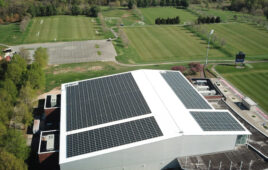Navisun has completed two solar projects in Massachusetts for a total of 3.8 MW of solar power. These projects are among the first solar projects in the state to earn the new pollinator adder through Massachusetts’ SMART Program.

Navisun completed two solar projects totaling 3.8 MW in Massachusetts with pollinator-friendly ground cover. Navisun
Through these projects, Navisun will also be able to implement pollinator habitats in all applicable future solar projects through its new pollinator program. These projects, one of which is a community solar project, are located in Orange and Sheffield.
To help reverse the loss of essential pollinator habitats and support greater food security, Navisun worked closely with ecologists to start its new pollinator program and was established in large part because environmental stressors, such as land development and pesticides, have caused the number of bee colonies per hectare to decline by 90% since 1962 among U.S. crops that require bee pollination. Insects such as bees and butterflies are responsible for pollinating nearly 75% of all crops consumed by humans.
With certification from the University of Massachusetts Amherst Clean Energy Extension, Navisun’s Orange and Sheffield projects met the state requirements for the SMART pollinator adder.
“Developing pollinator-friendly habitats is one more way Navisun demonstrates its conscientious commitment to the environment and land stewardship,” said John Malloy, managing partner and co-founder of Navisun. “They are part of our underlying commitment to farmers, landowners, and the communities we serve, and we’re pleased to formalize our pollinator program.”
In order to be certified as a pollinator-friendly facility, site grounds must be prepared and maintained to promote native meadow habitats under and around solar panels. Among many requirements, achieving the UMass certification includes planting native flowering herbs and shrubs, stopping use of insecticide or fungicide, maintaining bee nesting habitats and providing safe passageways along with project fencing for small wildlife.
“Speaking as a private citizen and Sheffield’s Select Board Chair, I am delighted this award has been given to Navisun for pollinator-friendly actions at their Home Road solar array,” said Rene Wood, project partner and chairwoman of the Sheffield’s Board of Selectmen. “Sheffield is a Right-to-Farm community; In 2020, the Board adopted a pollinator-friendly policy to support the Agricultural Commission and residents. This award furthers our town-wide efforts and recognizes the critical role pollinators hold in our food production and well-being.”
News item from Navisun




“In order to be certified as a pollinator-friendly facility, site grounds must be prepared and maintained to promote native meadow habitats under and around solar panels.”
Developing such a habitat is one thing- maintaining it something else- it will be expensive because other vegetation will try very hard to see itself in. It will be expensive. I have been a forester since 1973 so I know this for a fact- not a theory.
Very interesting. E2Tech is hosting a pollinators and dual use solar forum on World Bee Day, which is May 20. Learn more at e2tech.org buzz buzz